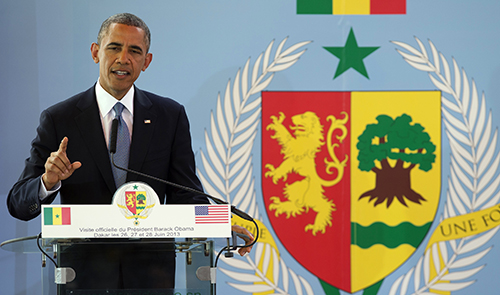
Editor's Note: This op-ed originally appeared on the Hill.com
NAIROBI — President Obama recently concluded his six-day trip to the African continent, ticking off successful stops in Senegal, South Africa, and Tanzania. Many Americans saw the trip portrayed on a superficial level, viewed from a distance and measured by the height of whipped-up froth such as the cost of a presidential safari. However, for many of us on the ground in Africa, we saw the president’s visit as a historic opportunity whose chief objectives were first, to recognize the shifting political and economic landscapes of sub-Saharan Africa; and second, to signal a transition in U.S.-Africa policy towards increased trade and investment as means of creating economic growth and stability. President Obama delivered a case for growing trade relations among African states, overcoming barriers that restrict economic opportunities, and deepening engagement for U.S. private sector investment.
The message President Obama brought was clear: democratic reform, the development of opportunity for young leaders, and making peace and security a priority are all essential for economic growth and capacity building on the continent—and we the United States want to be a partner in that growth.
Nowhere is this message more critical than in the Great Lakes region, especially in the Democratic Republic of Congo, or DRC, Rwanda, and Uganda.
With Secretary of State John Kerry’s recent appointment of former U.S. Senator Russ Feingold as Special Envoy to the Great Lakes region and to the DRC, the Administration can deliver on its commitments to increase trade and development in Africa.
Many of the economic incentives that drive ongoing conflict reside in the region’s capitals—Kinshasa, Kigali, and Kampala. There, the political elite maneuver their proxies in the field. These proxies, such as the rebel group M23 in Congo, skirmish over access to strategic minerals reserves and trade routes; claims to land around Congo’s eastern border; and the militarization of politics that typifies eastern Congo’s socio-economic landscape.
There is good news. After nearly 20 years of armed conflict in eastern Congo, an opportunity for peace and prosperity is taking shape. United Nations Secretary General Ban Ki-moon recently demonstrated a commitment to ending the conflict by appointing former Irish President Mary Robinson as the U.N. Special Envoy to the Great Lakes. Her appointment came with promises of increased transparency, accountability, and inclusivity. These promises, if realized, could make the peace process more comprehensive and effective than efforts to date.
Read the rest of the op-ed here.
Photo: Obama speaks in Senegal, June 2013 (AP).

